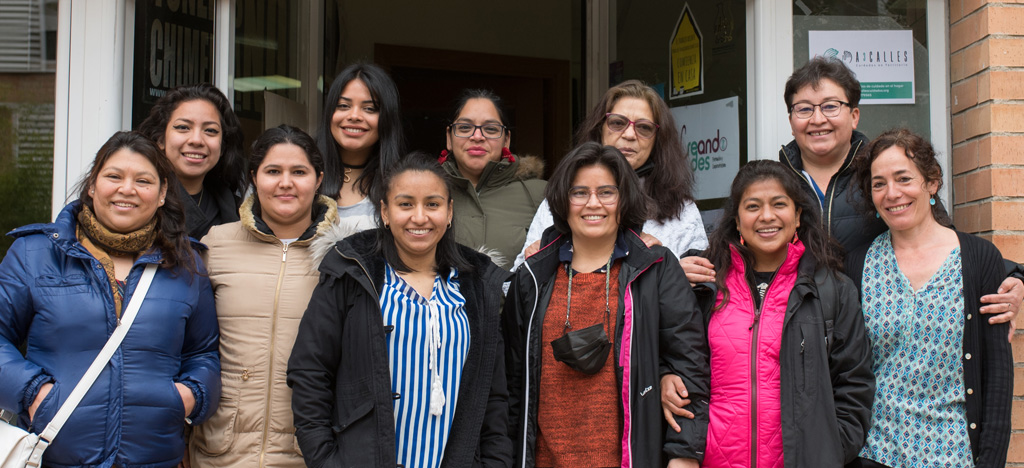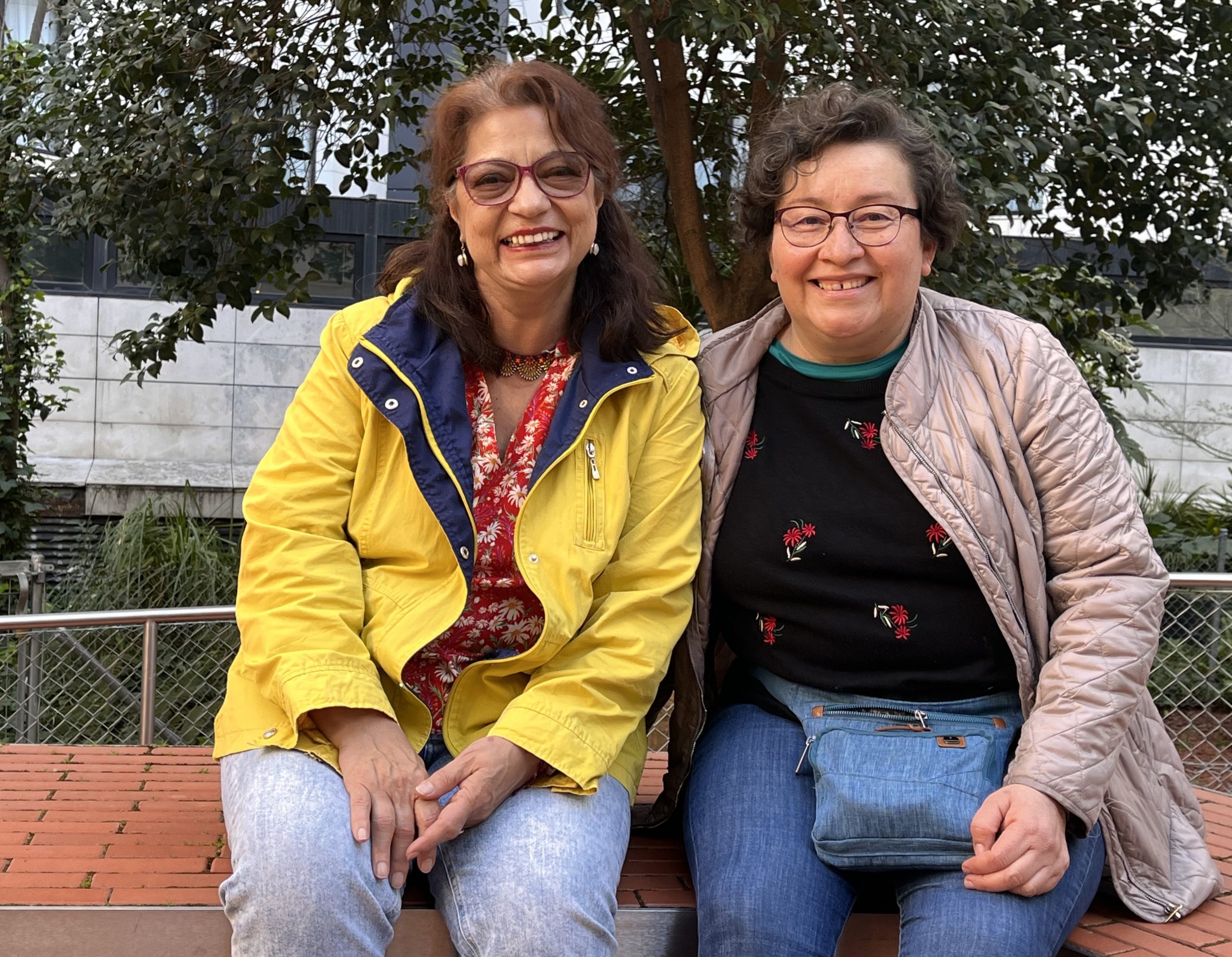This post is also available in: Français (French) العربية (Arabic) VO
“Home-based workers live the lives of the people they care for. They have no lives of their own.” Graciela Gallego Cardona, a Colombian woman, arrived in Spain 22 years ago and has since spent 17 years caring for elderly people in their homes. But this situation turned unbearable on 8 March 2018 when, while opening the kitchen window and spotting the gate outside the home where she worked, it suddenly dawned on her that she had been living in prison for too many years.
2018 was also the year of the great feminist strike in Spain, and migrant domestic workers had been very active at the heart of that movement for years. This mobilization spurred the healthcare strike during which tens of thousands of women decided to make their solidarity clear by hanging aprons from their balconies. But many women, Gallego included, could not go on strike because they had to ensure the continuity of the care they provided. “It was not easy for me to get the person I took care of to let me hang an apron from their balcony. And when I opened the window and saw the bars of the gate outside, I had a very strange feeling–I really felt like I was in prison, and I remember thinking for the first time: Clearly, I must be doing well since they're giving me Saturdays and Sundays off.” When she explains this, it’s years later, sitting in front of the Museo Reina Sofía in Madrid, the city in which she has spent almost half her life. “We work alone and take care of people who are also suffering from a loneliness they did not choose,” she adds.

Shortly after she starts speaking, Gallego points out that the people who employed her were generally respectful. Still, the more time passes since she stopped working in people’s homes, the more evident it has become that it’s a “form of modern slavery that’s protected by the law, no less: the Aliens Act which forces us to work in someone’s household for three years before we can regularize our status and seek other work.”
There are three ways to obtain a work and residence permit in Spain: by buying a house for more than half a million euros, getting a job offer for 40 hours per week for at least one year, or—and this is the most commonly used—making it through three years as an undocumented migrant before being able to ask to regularize your residency and professional status. A period during which you have no protections, and during which you are totally vulnerable in the face of any type of abuse. Migrants could be arrested and kept in CIE prisons until they are deported.
The aging Spanish and European populations, the disproportionate amount of women in the field of care, and the ever-longer working days have led to the creation, over the past thirty years, of what are known as “transational work networks.” Women from impoverished countries migrate to countries in the Global North where they are then employed in the most precarious sectors—agriculture, food service, and care—to be able to send some money back to their families, who partly depend on these remittances. This phenomenon cannot be separated from globalization, whose consquences are as numerous as they are diverse.
Domestic work, especially when carried out at someone’s home—i.e. the worker lives and sleeps at the house of the people they work for—is among the sectors with the most instances of abuse, committed with much impunity.
Domestic work, especially when carried out at someone’s home—i.e. the worker lives and sleeps at the house of the people they work for—is among the sectors with the most instances of abuse, committed with much impunity: poverty wages, malnutrition, insufficient time off, suffered indiginities, and physical and psychological violence. After the 2008 crisis, conditions worsened to the point that there were advertisements offering room and board in exchange for care for elderly people. And some people had to make do with these living and working conditions.
According to the Spanish Ministry of Equality, there are currently more than 600,000 domestic workers in the country, 95.5% of whom are women. Of these, only 376,000 were registered with Social Security at the beginning of 2023.
“From protest to proposal”
Graciela Gallego permanently stopped working at people’s homes on 28 February 2020, barely two weeks before the declaration of a state of emergency due to the COVID-19 pandemic. She came to this decision after ten years of activism within a network of organizations created by migrant domestic workers; they notably achieved the social revaluation of care work and the approval of laws recognizing the fundamental rights of these workers. When Gallego made her decision, she knew where to go: the La Comala cooperative.

“We created La Comala out of the need for social justice,” says Yamileth Chavarría Mendieta, who identifies herself as Nicaraguan, a peasant, and a radical feminist. She was one of the women at the heart of this cooperative, which has now been joined by 17 women workers. “The feminist social economy is essential for us. We don’t have clients or customers, but service users who want the women taking care of their children, their elderly parents, and their homes to have decent working conditions and to be able to reconcile their professional and personal lives so their children can benefit from the good education this country has to offer. It’s an alliance,” she explains, she herself having had to leave Nicaragua eleven years ago to save her life.

Yamileth Chavarría had created an association called La Casa de la Mujer (The House of Women) which became well-known for its radio series on sexist violence, La Bruja Mensajera (Messenger Witch). The show was very popular, but she started to receive death threats from violent men—on top of the other death threats she received because of the stance she took against the construction of a certain dam. “I came to Spain planning to spend a year here and get a postgraduate degree in theater therapy, and here I still am,” she explains, her smile never faltering.
She quickly set up the Brujas Migrantes (Migrant Witches) collective because “what women need when they migrate is proximity. They miss every single thing about their lives—which is why we can find products specific to their countries in their kitchens. They need to feel welcome, respected, and recognized for the importance of what they are bringing to the places in which they now live. But they also need to laugh. We have a whole set of litanies we recite as a joke to voice our protests, using humor as a form of protest against what we find unfair.” She illustrates this with the example of domestic workers’ lack of right to a sex life.
What women need when they migrate is proximity. They need to feel welcome, respected, and recognized for the importance of what they are bringing to the places in which they now live. But they also need to laugh.
This is just one of the taboos that the Brujas Migrantes have dismantled in recent years alongside other collectives such as Territorio Doméstico (Domestic Territory). They meet during weekends, when some of these women are available to pool their experiences, collectively come up with alternatives, and organize their political struggle. This explains why migrant workers in the domestic sector were at the head of the feminist marches in Spain in 2018 when the country became an epicenter of feminist revolt: they had been keeping the movement active and centered in real experience for years already, with fingers pointing at the colonialism, classism, and racism plaguing society. It is thanks to these women that we were able to understand what intersectionality means in practice.
“When we protested at Puerta del Sol in 2012 demanding that Spain adhere to Convention No. 189 of the International Labour Organization (ILO), we were only 30 people. Ten years later, we’ve filled up the square and succeeded in getting the Spanish government to ratify the Convention. We now contribute to the general system, are entitled to unemployment, can afford to get sick without risking starvation, and can obtain a pension under certain conditions. There are still many rights to fight for, but we have proven that it is possible to transform our realities.” The woman who shared these ideas with us also had to leave her country, like Chavarría, because her activism put her at risk of being assassinated. Mercedes Rodríguez arrived from Colombia 25 years ago through Amnesty International’s temporary host program for human rights defenders. She saved her life by coming to Spain, but she had to live a life on hold for many years. Until she decided that she “had no right to uproot her son yet another time.” So she stayed. Despite the fact that the Spanish government did not grant her any equivalences for her university degrees, that no one warned her that as a result, the Master’s degree she was going to pursue at a Spanish university would be worthless, and that she was going to suffer from the racism that domestic workers often experience.

“I was an activist with Amnesty International for years and fought against the war within the Mujeres de Negro (Women in Black) movement. But there was still an emptiness in me I couldn’t name—until we set up the Red de Mujeres Latinoamericanas y del Caribe (Network of Latin American and Caribbean Women).” It was after this that they then established Brujas Migrantes, sensing the urgency of needing to create a cooperative that would particularly serve women over 50 for whom domestic work was becoming increasingly difficult. Five of these women spent two years learning about the social economy and developed feasibililty and business plans, leading up to the creation of the cooperative. Thanks to word of mouth, there has been no shortage of work since. “Like we say in Colombia, we went from protest to proposal,” Rodríguez concludes.
Women researchers and human rights defenders

A specialist in social communication with more than 10 years of experience in radio production and digital communication, Norma Chavarría is also a member of the cooperative. She was forced to leave Nicaragua, where she’d participated in the 2018 protests. Since then, the Daniel Ortega regime has imprisoned more than 1,300 people who took part in or supported the protests, forced more than 100,000 others into exile, according to the UNHCR, and stripped more than 300 people of their Nicaraguan nationality.
Although numerous women mention having migrated to Europe in search of a better economic situation, many had to flee various forms of violence and repression and were looking to go somewhere their rights would be respected. “I never intended to migrate. At first, you have to overcome this pain, this rage you feel. But at the same time you also have to work, because here you need a lot of money to survive,” she explains during one of her breaks. Her companions all agree. Sitting in Retiro Park, Chavarría points out that the La Comala cooperative “supports them as human beings and as the workers of today and tomorrow. It helps [us] and gives meaning to the importance of contributing to Social Security.”
One of the characteristics of the members of La Comala is that they work, for the most part, in a network with other organizations and participate in various spaces dedicated to the fight against the discrimation that domestic workers and migrant women are subjected to. “In the Red de Mujeres Latinoamericanas y del Caribe, we have a project in which we identify the different types of violence we suffer from when managing our documents with the administration. There was one case in which a young woman went to the police to report a person who was abusing her. The police demanded that she file a complaint before asking them to intervene. As she was undocumented, they put her on the list of people to be deported,” one person denounces, surprised by the structural racism in the country and the hatred that right-wing groups have towards migrants. “When I witness someone discriminating against another person, I intervene, I speak up, because it hurts and bothers me a lot. We pay taxes here and we want to pay taxes so that the system can protect us,” she explains with an irrefutable logic.
“I’d like society to become a little more aware of the importance of care work, of the well-being we offer people”
Debates on domestic work
During the pandemic, everyone recognized the value of care work as essential, indispensable for survival. When several elderly domestic workers quit their jobs after contracting COVID or out of fear of getting sick, the companies managing these jobs started hiring people they’d never considered representing because of racism or transphobia: migrant, Black, and trans women. But another problem arose. When schools closed, many domestic workers had to leave their children home alone to continue caring for the people they worked for. At the same time, many domestic workers were fired because, since they were confined, some families decided to save the money and take care of their parents themselves.
For several years now, people have been campaigning to abolish the regime of domestic work because it is incompatible with certain fundamental rights, such as the 8-hour workday. But members of La Comala—like Gallego, who lived as a domestic worker for 17 years—believe that we must start at the very beginning: “If you live in Madrid, where you have to pay 300 to 400 euros for a room, and your salary is 800 to 1,000 euros, what kind of life can you have? And if on top of that you have people to support back home where you’re from, the only feasible solution is to be a domestic worker.” This is why Gallego believes that the first step is to repeal the Aliens Act and introduce public policies to support caregivers. “Aid is needed so that families can hire three different people in cases where permanent help and presence is needed. There are many such cases. A pension does not cover these expenses.”
The most humiliating experience Gallego had to go through was when her new boss asked her to sleep in a tent in the garden of the chalet she’d just arrived to. “I immediately refused,” she says, still in disbelief.
But she points out that, despite everything, the situation has improved over the last twenty years. And not only from a regulatory point of view, but also in terms of social consideration for this type of work. “When I arrived in Spain, several friends were also bringing their children for family reunification and had to share the room with them. Their bosses would ask them to clean their own children’s houses in exchange for letting the domestic workers have their kids there, for example.” The signing of ILO Convention No. 189 also led to the disappearance of the withdrawal clause according to which domestic workers were the only workers who could be fired without any type of justification or compensation. This is all a direct result of the long struggle they have waged, with which other feminist and human rights movements have not always engaged—not as much as would be expected.
Gallego is getting ready to go take care of Luisa Fernanda, with whom she spends four hours every afternoon. “I work a lot with people who have Alzheimer’s now—it has to be quality care that I offer,” she explains cheerfully. And, before leaving, she adds, “I’d like society to become a little more aware of the importance of care work, of the well-being we offer people. It should become more prevalent for society to go through cooperatives to employ us. We can’t compete with big companies like those of Florentino Pérez (the President of Real Madrid). But what we can do is give value to care and people.”































